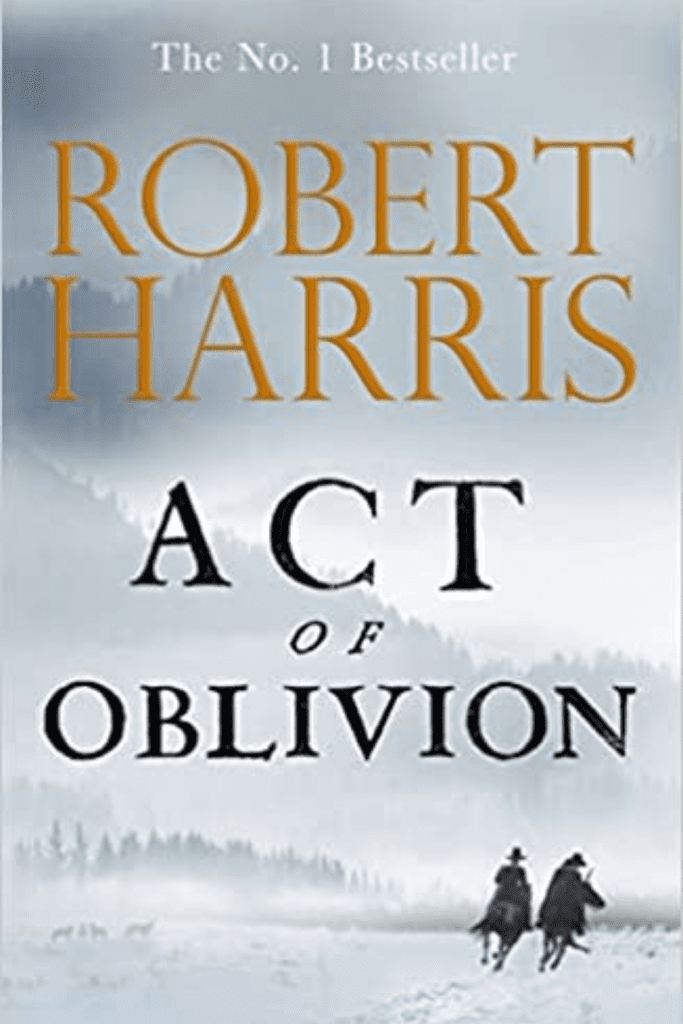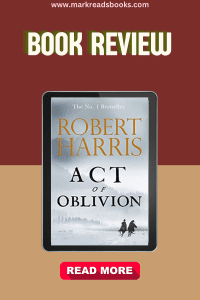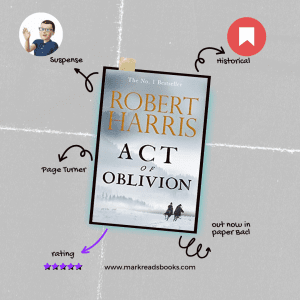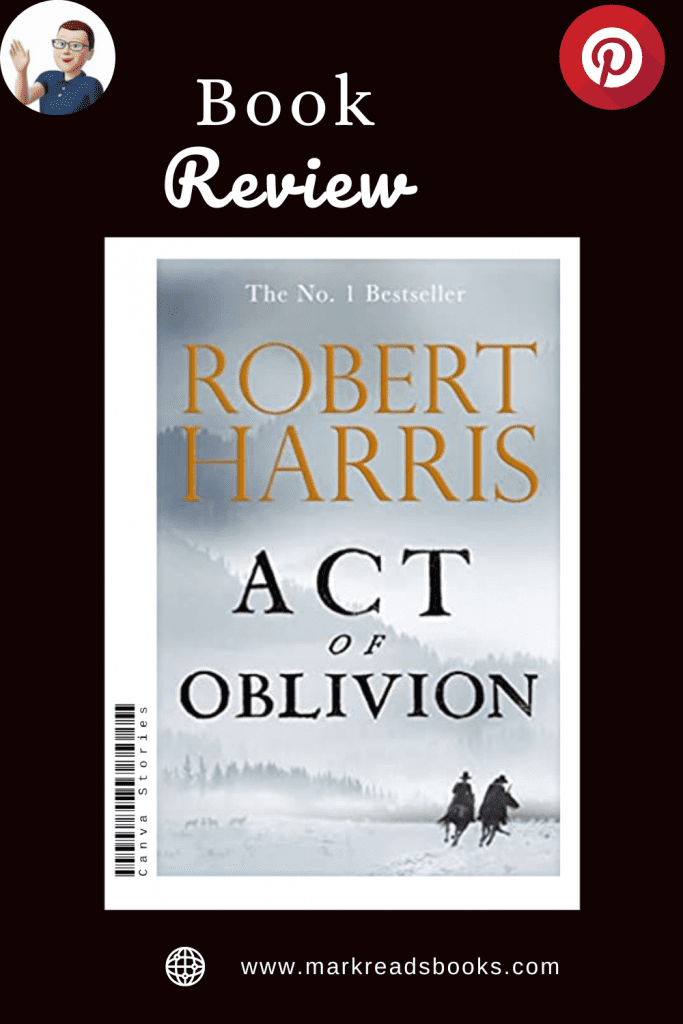Act of Oblivion is a captivating historical thriller that showcases Robert Harris’s mastery as a storyteller. With a well-researched setting, engaging characters,

| Title | Act of Oblivion |
| Writer | Robert Harris |
| Publisher | Harper |
| Publication date | 1st September 2022 |
| MBR star rating /5 | ⭐⭐⭐⭐⭐ |
| Genre | Historical Fiction General Fiction (Adult) Suspense |
fact sheet
Tags

Synopsis: Act of Oblivion
In Act of Oblivion, Robert Harris brings to life an intense historical manhunt set in the turbulent aftermath of the English Civil War. The year is 1660, and England is in the throes of retribution. With the monarchy restored, the newly empowered royalists seek vengeance on the men who signed King Charles I’s death warrant, a fateful act that shifted the nation’s balance of power. The Act of Oblivion mandates death or imprisonment for those involved in the regicide, and while many have already been caught or killed, two of the most infamous figures—General Edward Whalley and his son-in-law, Colonel William Goffe—have escaped to the New World.
As the fugitives evade capture in the dense, rugged wilderness of 17th-century New England, they face not only the harsh realities of colonial life but also the relentless pursuit of Richard Nayler. Secretary of the regicide committee in London, Nayler is a man of single-minded focus and iron will, charged with hunting down the remaining conspirators. Driven by personal motives and duty alike, Nayler will stop at nothing to capture Whalley and Goffe, lured by the substantial bounty on their heads.
With meticulous historical detail, Act of Oblivion takes readers on a gripping journey through colonial America’s untamed landscape, following the cat-and-mouse pursuit that pits survival against justice, and loyalty against betrayal. Harris masterfully explores themes of loyalty, retribution, and the haunting legacy of a war that divided a nation.
Review of Act of Oblivion
Robert Harris’s latest novel, Act of Oblivion, masterfully captures the tension and turmoil following the Restoration of the English monarchy after the fall of Oliver Cromwell’s Commonwealth. Set during a gripping period in English history, the novel follows the relentless pursuit of those involved in the trial and execution of King Charles I. Harris combines historical fidelity with richly imagined characters to create a story that is both an intense thriller and a reflective exploration of loyalty, guilt, and justice.
Themes and Historical Context

Set in the 1660s, the novel plunges readers into a tumultuous time in England’s history. The restoration of King Charles II to the throne marked a time of reckoning, as royalists sought retribution for the execution of his father, Charles I, by the Commonwealth. The title, Act of Oblivion, references the Act of Indemnity and Oblivion, a royal decree pardoning most of those involved with the Commonwealth, except for the “regicides” directly responsible for the king’s death. This period provides a fascinating backdrop for Harris’s novel, as he delves into the obsessive hunt for justice by those loyal to the crown.
The novel explores themes of duty, morality, and the shifting nature of belief. The duality between loyalty and regret is particularly well-illustrated through the characters of General Edward Whalley and Richard Nayler. Harris raises complex moral questions: Is it ever justified to execute a king? Can one truly be loyal to both a cause and one’s conscience? These themes are timeless, resonating beyond the historical setting.
Characters
Harris’s depiction of General Edward Whalley, one of the two fugitives at the heart of the novel, is one of the book’s triumphs. Whalley is portrayed as a complex, introspective character who wrestles with the consequences of his past actions. As he grows older, Whalley reflects on his role in the regicide with increasing ambivalence, his evolving beliefs feeling genuine and deeply human. This psychological depth allows readers to see beyond the historical figure and connect with Whalley as a man haunted by his own choices and the shifting political landscape.
The other main character, Richard Nayler, is Harris’s fictional addition to the story—a relentless and nuanced man devoted to hunting down the regicides. Though he did not exist in real life, Nayler is vividly portrayed with a backstory and development that make him as real as any historical figure. His pursuit of Whalley and his comrade, Goffe, is fueled by both duty and a personal sense of justice, creating an antagonist who is both tenacious and, at times, sympathetic. The dynamic between Nayler and Whalley elevates Act of Oblivion beyond a simple pursuit tale, as both men embody conflicting ideals that challenge the reader’s loyalties.
Writing and Style
Harris’s writing is sharp and engaging, propelling the story forward with well-crafted suspense and historical detail. His ability to capture the essence of the 17th century without overwhelming readers with exposition is impressive. The pacing of Act of Oblivion keeps readers on edge, balancing tense action sequences with moments of quiet introspection. Harris’s exploration into his characters’ inner thoughts is especially effective, allowing him to present multiple perspectives on the same event and deepening the reader’s understanding of the moral complexity involved.
The novel reads like an “old-fashioned page-turner,” as you described—a style Harris is well-known for. He builds suspense expertly, and while there are action-packed moments, the real strength of the book lies in its psychological depth and moral complexity. This combination of action and introspection makes the novel appealing not only to history enthusiasts but also to fans of character-driven thrillers.
Conclusion
Act of Oblivion is a captivating historical thriller that showcases Robert Harris’s mastery as a storyteller. With a well-researched setting, engaging characters, and a plot that keeps readers invested from start to finish, it’s a novel that feels both urgent and timeless. The complex portrayal of Whalley’s regret and Nayler’s tenacity adds layers to the narrative, elevating it beyond a mere chase.
For anyone interested in historical fiction that delves into the personal and political aftermath of major events, Act of Oblivion is an absolute must-read. Harris’s storytelling offers both a thrilling escape into a bygone era and a thought-provoking examination of loyalty, justice, and the human cost of political upheaval. This is historical fiction at its finest, and Harris, without a doubt, is a writer at the top of his craft.

Further reading
on Mark Reads Books
External Links

If you would like to see some more Insightful Book Reviews check here
Like follow or share if you would want similar content.
Above all Keep Safe and treat people fairly.
Mark.